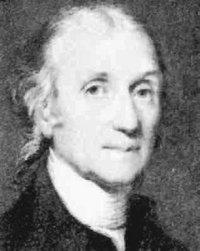Henry Cavendish
Cavendish, Henry
Henry Cavendish (1731-1810), an English chemist and physicist who first isolated several key chemical compounds. In 1766, he published a paper titled Three Papers containing Experiments on Factitious Airs in which he identified what he called "inflammable air" (later termed hydrogen by Antoine-Laurent de Lavoisier) and "fixed air" (or carbon dioxide) as substances that should be distinguised from air. In 1783 he demonstrated that the composition of air was constant regardless of the geographic region or altitude sampled. Cavendish discovered nitric acid (HNO3) and proved that water was not an element but was, rather, made up of gases. Cavendish also used a sensitive torsion balance (the Cavendish balance) to measure the value of the gravitational constant, G. This allowed him to calculate the mass of the Earth. Henry Cavendish published his findings only sporadically, thus leaving some of his significant discoveries unknown until long after his death.
Further Reading
Biography of Henry Cavendish (Eric Weisstein's World of Science: A Wolfram Web Resource)
